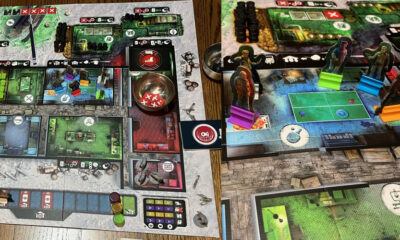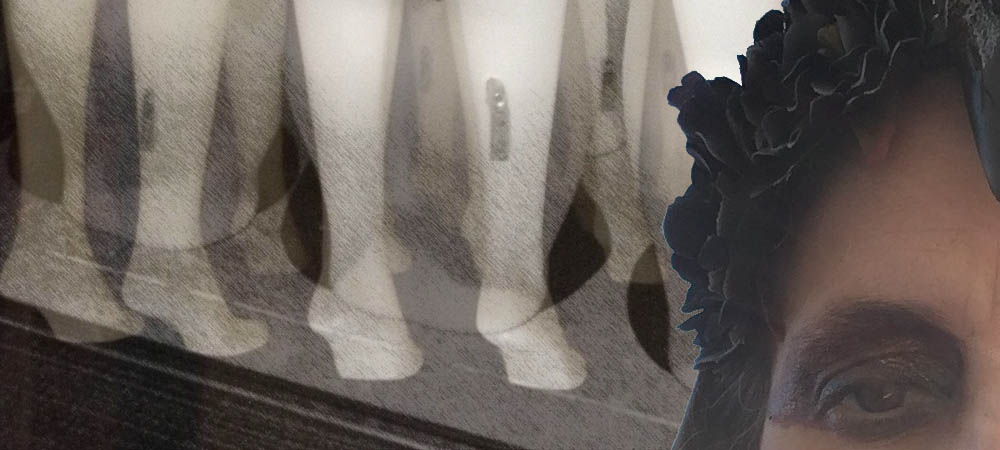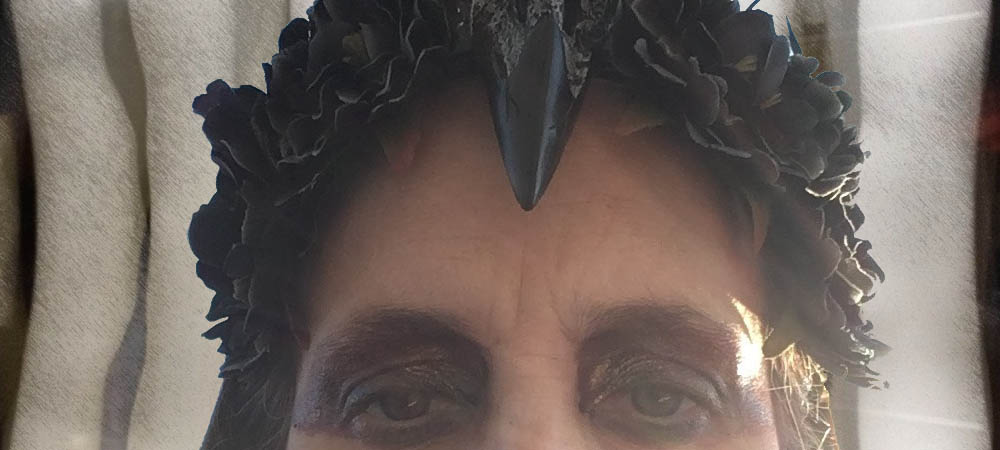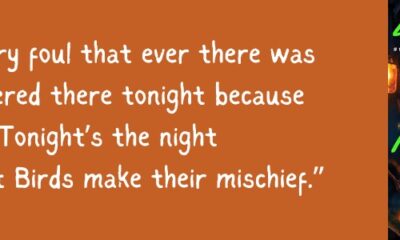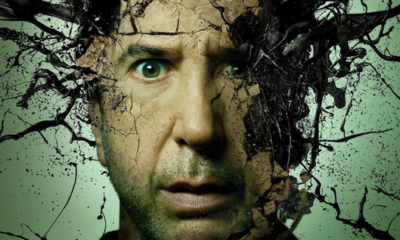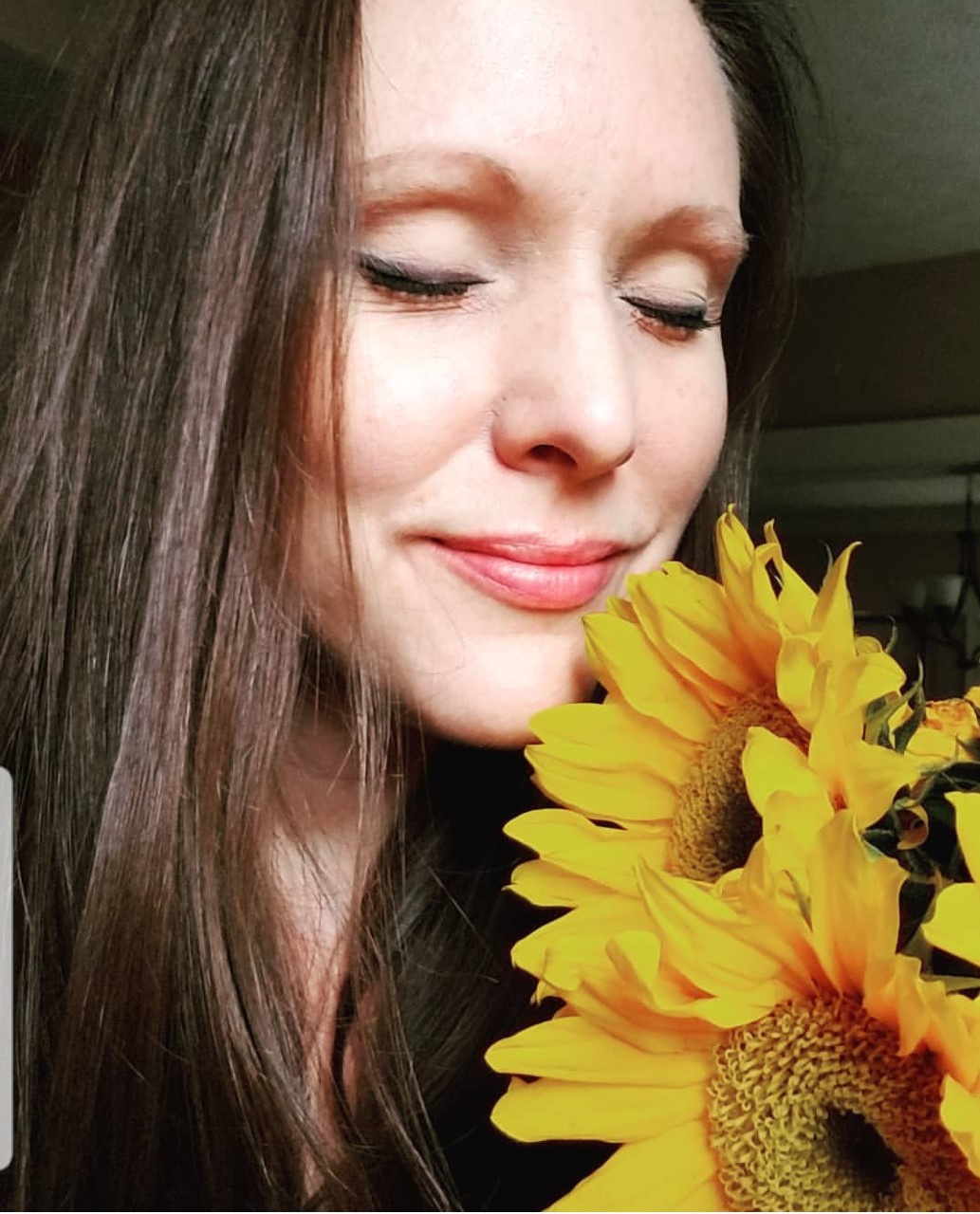
Haunted MTL Original – Wicked Pieces – Mary Leoson
More Videos
Published
5 years agoon
By
Shane M.Wicked Pieces by Mary Leoson
The crone’s skin sagged like a melting candle. It hung in drips rolling off her face—molten, dying. The eyes were marbles peeking from sockets, pale and glassy. They faded more each day, dimming windows to the outside world. Her lips, once blood red, had given way to pale pink and yellowed at the edges like old paper. Crevices reached out like branches, tears in smooth fabric, worn with time.
This was what Melissa saw when she looked in the mirror—a shadow of what once was beautiful. She’d sit for hours, gazing into the surface, haunted by a distorted reflection. Her beauty stared back at first, poised beneath a layer of powder, lashes curled, lips stained. But the image morphed before her eyes. The color faded. Flawless skin wrinkled. The sand slipped through the hourglass, grain by grain.
Each heartbeat was a wish not granted, a dream escaped to the cobwebs in the corners of the room. They clung there like flies meeting their doom, thrashing about as a spider came to feed. Life’s poison pulsed through her veins, sucking away vitality, seeping in through the cracks in her face.
There was a time she longed to be older, to feel freedom and a man’s affection. The foolish girl was still trapped inside her somewhere, clawing to escape the fleshy prison. She thought she’d be an actress, embodying drama and moving her fans to tears. Or, she’d be a lawyer, righting wrongs with her wits. Maybe she’d be a homemaker, nurturing children and a husband, making warm meals, followed by chocolate chip cookies and bedtime stories before sweet kisses goodnight.
The hag’s mouth turned up at the corners, remembering a simpler time, a hopeful one. But reality leaked in through the edges, drawing the smile downward, tugging on the loose skin, too tired to argue. None of these plans had manifested according to her dreams. Her mind tumbled, looking for someone to blame. Her mother should have warned her better—made her go to college. Her father could have supported her—given her the push to pursue law. And her husband, the ghost of the man she’d fallen in love with, might have shared the spotlight. Now she was nothing but the failed actress. The college drop-out. The aged mother, only called when a bill is overdue.
Her gaze hung low, focused on a hairbrush that held too many loose cast-offs, graying and forgotten. When her eyes returned to the mirror, she was met with a pointing finger. It hung there like a fire iron, ready to stir her ashes. The nail had grown out, the remnants of what had been a lovely manicure, now chipped and uneven along the edge. The knuckles were swollen, worn from cracking under pressure, angry and defiant. The finger blatantly accused her, egged her on.
“Don’t you point at me,” she whispered. “I gave up everything for them. I am a goddamn saint.”
Her nose rose in the air as she spoke, her ego inflated. But she did not look dignified. Her nostrils flared and her eyes became slits, threatening, venomous. And the finger pointed.
“Fuck you,” she said, her voice louder. But the finger didn’t falter. In fact, it inched closer. At first, she thought it was her imagination. She blinked. She rubbed her eyes. She even sat up straight, shook her head. But it kept moving, crawling toward her.
It touched the surface of the mirror and bulged out, a bubble of reflection intent on grabbing her. Melissa jumped, tensing in alarm. She tried to stand but fell backward and off the dainty dressing stool. She struggled to her hands and knees, then took a breath. Surely, her eyes were playing tricks on her. She shouldn’t have mixed that Xanax with the wine. At this realization, she rolled her eyes, laughing at her silliness. Of course, it was the medication. The hilarity took her until she giggled and tears streamed down her face.
As the laughter dissipated, she looked up to the ceiling where the shadows crawled with the setting sun. It would be time for bed soon, and she’d put these demons to sleep. For now, she indulged her buzz, wondering what life might have been like had she made different choices.
Her lips were still spread in a smile when she heard the cackle. It came in a delayed echo, bouncing around the room, growing louder with each pass. Had the laughter ever belonged to her? It was dark—sinister. Cupped hands covered her ears, tighter, harder, but brought no relief. She shut her eyes and opened her mouth to scream but then the silence came suddenly. It engulfed her in perfect quiet, empty and haunting.
Melissa hesitated, then crawled on her knees toward the dressing table. Graceful, young hands reached up to steady herself on its edge. She rose slowly, peering over the polished surface, past the perfume bottles and makeup brushes, to the looking glass. Within was only gray, a dull reflection of the fading wallpaper on the other side of the room. As her knees straightened and she stood slowly upright, the image adjusted, and her young face emerged.
The woman was beautiful, though her eyes were wet with tears. The wrinkles were gone, like an eraser had rubbed them away. Her red lips were pouty, her neck creamy and smooth. She dared not breath. She wanted to look like this forever. She wanted to freeze time.
Without her permission, her hand reached out to touch the image, so beloved. She was an angel, a promise, a muse. To her surprise, the reflective surface was warm, but she didn’t want to question it. The likeness moved with her in perfect choreography, swishing this way and that. She was enraptured
The hum started slowly, like a flapping of wings. Not one pair, not two, but thousands, moving together, keeping the time at bay. She stood taller, prouder, reveling in what she saw. She could do anything when she looked like this—young, beautiful, ideal. People would listen to her now. Men would do her bidding. Women would envy her. It was everything she wanted. It was power.
Her chest swooned with hot breath, her pride growing, her smile spreading. And she focused on the irises that peered back, vibrant and determined, filled with life. But they flickered—a small shift that brought with it a memory. And the doubt snuck in between joy and ecstasy—feelings of regret, fear, worthlessness. The edges of the mirror turned rusty and the hum dimmed, making way for a scream that held the power of her youth—the collective dreams she should have released long ago. Her hope had been locked in a cage, rotting. It made one last bid for freedom as vanity.
The lovely smile morphed into a wicked grin. It was seductive, unforgiving, determined. White teeth flashed between rich red lips, the edges pointing toward charming dimples. They danced, taunted, whispered, “come hither.” Melissa froze and the smile was no longer hers. Before she could pull her finger away from the surface, a gnarled hand grasped her wrist. It tightened, twisted, burned.
The scream exploded from her like a shrieking cat, high and sharp. It scorched her throat, strangling her from within. She pulled away desperately, but the harder she yanked, the stronger the vise became. It drew her toward the mirror like a black hole, slowly, steadily, until she came face to face with herself. Her nose crushed against silver, breath fogging the surface between screams, until there was a crack.
Shards pierced her skin. Liquid dribbled onto the table, covering the lipstick, the powder, the delicate perfume bottles in sticky crimson. Skin peeled like an onion layer, and what was once pristine became marred with gore. The blood glittered with diamond debris, a last light for a dying hope. The actress sighed dramatically, the lawyer swore revenge, and mother grieved what once might have been. And the last thing Melissa saw before the darkness took her was her beautiful face in pieces.

Leoson teaches composition and psychology courses at the college level in Cleveland, Ohio. She loves to write with her dogs at her feet and somehow survives on decaf coffee and protein bars. She holds an M.A. in English & Writing from Western New Mexico University and an M.S. in Psychology from Walden University. Her writing has been featured in the Twisted Vine Literary Journal, TWJ Magazine, The Write Launch, GNU Journal, The Gyara Journal, Genre: Urban Arts, Obra/Artifact, and on NPR’s “This I Believe” series. You can learn more at www.maryleoson.com
You may like
-
The Thing in Review, Movie 1, Movie 2 and the Board Game
-
Betty Lou’s Treasure Trove: Mannequin Horror Summer Series by Jennifer Weigel, Index & BONUS
-
Betty Lou’s Treasure Trove: Mannequin Horror Summer Series by Jennifer Weigel, Chapter 7
-
Betty Lou’s Treasure Trove: Mannequin Horror Summer Series by Jennifer Weigel, Chapter 6
-
Betty Lou’s Treasure Trove: Mannequin Horror Summer Series by Jennifer Weigel, Chapter 5
-
Betty Lou’s Treasure Trove: Mannequin Horror Summer Series by Jennifer Weigel, Chapter 4
Original Creations
Arctic Horror – A Chilling Tale of Survival and Terror by Nicole L. Duffeck
Published
1 day agoon
January 30, 2025By
Jim PhoenixArctic Horror
By Nicole L. Duffeck
“Arliiiii.” The figure before him groaned. “Arliiiii.” Jung Kook could have sworn it was his own voice, echoing back at him, but that was impossible. The wind all but stole your voice before it had a chance of reaching your companion standing mere feet from you.
Jung stopped short, conflicted between being euphoric over finding Arli and confused at this sudden development. “Arli? What’s going on? Are you ok?” Jung asked, his words coming out in a jumbled rush.
“Arliiiii?” The thing before him mimicked the question.
Some primal part of Jung’s brain took over before the conscious part of his mind could make sense of what his body was doing. Before he knew it, he was running for the habitat door. Behind him, he could hear a shuffling as the thing followed him, its breath seeming to rattle in its chest.
Fourteen hours earlier
There’s a certain horror in not knowing what comes next: When you’ll get your next meal, your next breath of fresh air, the next time you’ll feel the sun on your face, the next time you’ll feel someone embrace you. That was the downside to any Arctic expedition: the instant insanity of endless night, of deadly cold, of breaths that turned lungs to ice, the isolation of snow and silence, the strain of ears to catch a sound other than the omnipresent howl of wind and scouring ice.
That night (or was it day? It was impossible to tell when the body and brain were in a perpetual state of darkness) there was a sound, or maybe the memory of a sound. A soft keening, moaning sound that could have been the wind or a wounded animal or any number of things. Whatever the source, it set Jung Kook’s nerves on edge, shredding his sanity in nearly imperceptible increments.
Wondering if he was finally succumbing to the white madness, he poked his head out of the thermal blankets and looked at the digital clock on his bedside table. The red lights displayed that it was nearly seven in the morning; time to get up and perform the morning systems check. There was at least that: the comforting routine of checking the weather measuring instruments, the environmental systems that kept him and the other scientists alive in a climate that was hellbent on killing any living creature that hadn’t evolved to exist there over the course of several millennia. As it was, Jung was the only living human at the Z-037 outpost, the others having left four days prior to beat the storm; the same storm that was preventing the relief team from coming in. Jung had stayed behind to ensure the continual running of the research station and, if he were honest, to hang onto the gossamer-thin hope that Arli was alive somewhere, out there, in one of the outbuildings and had just had to ride out the storm. The logical, scientific part of him knew that wasn’t possible; that Arli had fallen into a glacial crevice or succumbed to the elements after having gotten turned around in one of the many whiteouts that would hit with little to no notice.
More than likely, the sounds he was hearing were a combination of guilt, hope, and despair manifesting in the form of the white madness. Regardless, Jung kicked his feet out of bed, heedless of the thermal blanket he had been wrapped in falling to the floor. The ambient temperature of the habitat was still uncomfortably low since the inhabitants weren’t expected to be out of bed for another fifteen minutes. Resources were scarce out here, making rationing and frugality a matter of life and death.
Jung donned his heaviest sweater, hat, winter outer pants, and opened the door to his quarters. The first thing he noticed was the oppressive silence of the module he had been calling home for the past three months. Having only been alone for four days, he hadn’t grown fully accustomed to there being no other signs of life. Even if all the other personnel were sleeping, there were still the sounds of snoring, breathing, talking in their sleep, or simply absorbing the cacophonous stillness. The suddenness of the Z-037 bringing itself into day mode made Jung jump. The lights came on to their full brightness, the HVAC turned up a few levels bringing it from a low white noise to a full hum and, most importantly, the coffee machine began brewing.
Jung made his way to the kitchen and took a few sips of too-hot coffee before moving on to the brain of the hub. The control room was insulated between four walls of thick steel and kept environmentally stable with its own climate control, powered by its own solar panels and backup generator. Jung took his time checking the instrumental readings, the surveillance footage, and the habitat’s artificial intelligence. Everything was running as it should, but Jung was reluctant to leave the control room; there was something comforting in being in front of screens, even if all they were doing was showing him the vast, white expanse of the snowfields, unbroken only by the UN’s outbuildings, a few snow machines, and an all-terrain utility vehicle.
The silence and unbroken view lulled Jung into a sort of waking torpor, his mind wandering to Arli and the last time they had seen each other. They had been arguing about what Jung couldn’t remember—that’s how trivial it had been. Arli had gone against the weather recommendations and stormed out into the ice fields, stating he needed to check on the penguin population he was there to observe. That was the last Jung, or anyone, had seen of Arli. Shortly after leaving, a massive windstorm blew across the plain; stirring up ice and snow, blinding any creature that was unfortunate enough to be out in it.
A noise pulled Jung from his reverie; a low, faint keening, the same sound that had roused him from his sleep. He scanned the CCTV screens, looking to see what the source of the noise was. At first, there was nothing on the monitors except the vast expanse of the plains. Just as he was about to stand and walk away from the desk, he saw it: A small corner of what looked like blaze orange; the same color of clothing the crew wore for outerwear, the best chance they had of being seen in a whiteout. He could dismiss the sounds as nothing more than the wind or a lost and starving arctic fox but the scrap of cloth – that couldn’t be discounted. Since there was no one else but him and the countless dead explorers who’d come before him at the base, the only rational explanation was that Arli was out there, alive and trying to find his way back to the base.
Jung jumped up from his chair and ran to the antechamber that would lead to the outside. There, he hastily dressed for the tundra, forced the door open, and stepped out into the violent gale.
Strung from the habitat and anchored in place at intervals using lead pipes was a blaze orange cord, now frosted white from snow and ice. For a moment, the rational science brain whispered that he had just seen a flash of the cord and not a sign of Arli struggling to get home to him. Jung pushed the thought away and fought his way forward against the hurricane-force winds.
Above the howl of the wind, Jung heard the keening sound again. Louder, despite the weather. He could just make out a single word, his name, “Jung,” being cried out against the storm. He knew, with the certainty of a man who’d heard the voice a million times, that he was hearing Arli call for him, calling to him for help.
Jung’s lungs and heart nearly burst. Arli was alive! He knew Jung was there, coming to him, coming to find him and bring him back to warmth and safety. Fueled by blind determination, Jung tried to quicken his pace, but the elements persisted in slowing him down; all he was doing was wasting energy and calories, both of which needed to be rationed. He needed to be logical, clinical if he was going to get himself and, more importantly, Arli, back to safety.
Jung forced himself to slow down, to get his bearings and trudge calmly and methodically through the drifts of snow and blinding wind. With one hand, he held fast to the guideline and, with the other, he prodded the ground with his walking stick. Chances were, Arli was using the same cord or, worst-case scenario, he was unconscious in one of the snowbanks. If the first, they would meet somewhere along the line. If the latter, the walking stick would issue the tactile warning that there was an anomaly beneath the waist-high embankments.
The going was slow, and the cold was taking its toll on Jung. His feet and hands were beginning to go numb, and his eyelashes, beard, and mustache were crusted in ice, creating an all too persistent time clock, telling him he couldn’t stay out of the habitat much longer. His heart insisted he go on but the logical part of his mind urged him to be rational; if he succumbed to the elements, both he and Arli would be lost to the Arctic.
As if the universe finally started to care, the decision was made for him in the form of the guideline running out; he’d reached the end of the camp without finding any signs of Arli. It was time to go back and get out of his ice-encrusted gear and warm up. He could check the surveillance cameras for signs of Arli and make a plan to find him and bring him back.
Feeling downtrodden but bolstered by having an actionable plan, Jung found his way back to the habitat, discarded his outerwear, and brewed a cup of coffee before settling down in front of the monitors. There was nothing to see except for the omnipresent white of the landscape; even his footprints were all but swallowed up by the flurry. There was certainly no way of seeing if Arli was still out there unless he was upright and moving. Jung found that highly unlikely; he’d been missing for four days now. Unless he found shelter and food, he’d be weak from the elements and hunger…or worse. Jung shook his head, refusing to fall into the depression the flash of orange had pulled him out of. He’d find Arli, they’d get out of this godforsaken place together and spend the rest of their lives in a warm place.
Station protocol was that researchers only go outside once a day; even if they felt they’d warmed up to normal body temperatures. There was too great a possibility of the heart and lungs being damaged from the cold and the person not being aware of it. Despite being the only person there, Jung still followed protocol, the need to follow a structured pattern and adhere to the rules. The monotony and predictability staved off insanity thus far, it would have to continue.
Part of that routine was the midday systems check, reading the instruments, checking the life support systems, and reaching out to the main base with his status and the status of the station. The rhythm was soothing and allowed his mind to wander, that is, until a low noise pulled him out of his stupor. It was faint, just like the keening and, like the keening, it was persistent. Jung rose from his chair and walked quietly in his stocking feet, walking back and forth across the room, trying to ascertain where the noise was originating from. There! A sort of scritch, scritch, scriiiiitttccchhhh sound from the outside of the habitat. If there were any trees in the vicinity, he’d have thought the sound was being created from a branch scratching the walls but there was nothing of the sort on this barren plain. The sound was far to faint to be that of a moose or other wild beast. “Arli.” Jung whispered to himself. Arli had found the habitat! He was trying to locate the door in the blinding whiteout.
Jung ran to the surveillance room and flicked through the various screens, trying to find the right cameras with the correct angles that would show the outer perimeter of the habitat. In his haste, he’d skip over some cameras and double up on others. Jung forced himself to slow down once again, be methodical and check the cameras carefully. In the frame of Camera 3, he saw it, the proof he needed: Fresh boot prints. Arli was out there! He was certain of that now.
Rules be damned, he donned his dripping wet outerwear and hurled himself out into the weather. Rendered stupid with hope and love, Jung didn’t wait for his snow goggles to acclimate to the temperature change before charging in the direction of Camera 3’s view. He rounded the corner of the habitat and, in through the hurtling snowflakes, saw a shadow standing about eight feet in front of him. Through the fogged-up lenses of his goggles, Jung could just make out the blaze orange of the outerwear the field scientists wore. “Arli!” Jung cried out, tears of happiness and relief freezing on his face.
“Arliiiii.” The figure before him groaned. “Arliiiii.” Jung could have sworn it was his own voice, echoing back at him but that was impossible. The wind all but stole your voice before it had a chance of reaching your companion standing mere feet from you.
Jung stopped short, conflicted between being euphoric over finding Arli and confused at this sudden development. “Arli? What’s going on? Are you ok?” Jung asked, his words coming out in a rushed jumble.
“Arliiiii?” The thing before him mimicked the question.
Some primal part of Jung’s brain took over before the conscious part of his mind could make sense of what his body was doing. Before he knew it, he was running for the habitat door. Behind him, he could hear a shuffling as the thing followed him, shuffling, its breath seeming to rattle in its chest.
Jung slammed into the habitat door and fumbled with the handle as the thing stalked closer. Finally managing to get his numb, gloved hand to cooperate, Jung crashed through the door and slammed it shut behind him and, he could have sworn, he felt the hot, putrid breath of the thing on his skin.
Breathing heavily, Jung leaned against the door, trying to get his wits about him. That thing was Arli, he was sure of it but, also, positive it wasn’t Arli, at least, not the Arli he knew, the Arli he loved. What happened to him?
“Arliiiii.” He could hear his voice coming from outside the door followed by the scritch, scritch, sriiiiiiitcccch of, what he now knew, to be long, yellow claws.
Arli ran his gloved hands over his face, only realizing then that he was still wearing his outdoor gear when he jammed the goggles into the bones of his cheeks.
Checking again that the door was secure, Jung disposed of his outer wear, leaving them in a wet heap in the middle of the floor. Not caring that he was numb to the bone, he made his way to the surveillance room and brought up the camera for the front door of the habitat. There, he saw, hunched over itself, wearing tattered, blaze orange outerwear with the Z037 insignia emblazoned on its chest, the emaciated form of what had once been Arli. Arli had been a healthy, robust man and the thing that was scratching at the outside of habitat had ashen, papery, torn skin. Its lips were gone, in their place was chewed, ragged flesh. The thing had a stump where its tongue should have been. The tattered clothing revealed open, oozing wounds that wept despite the sub-zero temperatures. As he watched the Arli Thing, it tore a chunk of remaining flesh from its upper thigh, shoved it in it’s mouth and gnashed it with its teeth then swallowed it, the only trace left behind was sinew that clung to its teeth and a smattering of gore in the corners of its mouth.
Jung could taste the bile rising in his throat and heaved his coffee onto the floor, not caring about the mess. He needed to get out of there or he’d be the next gore in Arli’s teeth. He grappled with the comms system, finally getting it keyed up. “Z037 in distress! Z037 needs emergency assistance. Send help NOW!” He hollered into the microphone.
At first only static met his ear then, very lightly, he heard a keening, gargling “Arliiiiiii.” Jung dropped the mic and jumped back from the desk. Slowly, he turned. The thing that had been Arli was standing there, mere feet away and blocking the only door out.
The last coherent thought Jung had as the thing bit into his face and tore the flesh from his eye socket was that he had finally found what had happened to Arli.
Sometimes it pays not to be seen, especially if there are things that want to eat you or if you have to sneak up on things to eat them. So this time on Nightmarish Nature we’re going to look at some of the creatures known for being invisibles among us. Some of these critters engage in mimicry, intentionally looking like other specific things, but a lot of them engage in camouflage, just wanting to blend in. In this segment we’ll consider both but focus more on the latter.
Buggin’ Ya
Some of the most notable invisibles are masters of camouflage in the insect world… Moths and beetles that look like bark or dead leaves. Mantids and other insects that look like leaves or flowers. Those stick bugs and walking sticks that I’m not sure how to classify (are they some kind of weird relations to assassin bugs or their own thing?). And my personal favorite, Umbonia Crassicornis, a type of tree hopper better known as the thorn bug. And don’t even get me started on spiders and scorpions… You could come face to face with pretty much any of these critters while mucking around in your garden and be none the wiser for it unless their movement betrays their location or you happen to scan the area with a blacklight before you dig in. It’s jump scare central, for sure!
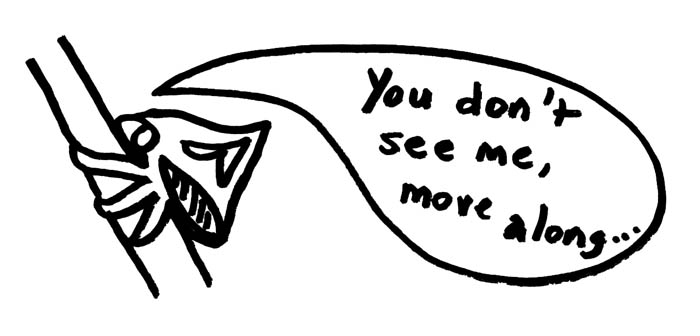
Leapin’ Lizards
Lizards and amphibians are also masters of disguise, often resembling their surroundings much like the insect world does. Chameleons are celebrated because of their ability to change color to match their surroundings, but there are several lizards that do this, just not to that extreme. Like anoles. Take a trip to Florida and you’ll soon find that you’re being stared at by a lizard you didn’t even know was there, seeing as how anoles are everywhere and get into everything (one recently startled my mother after making its home in a hallway decoration). You don’t even have to go to Florida, they range anywhere from Texas to North Carolina, and there are other lizards that range further north that do this as well.
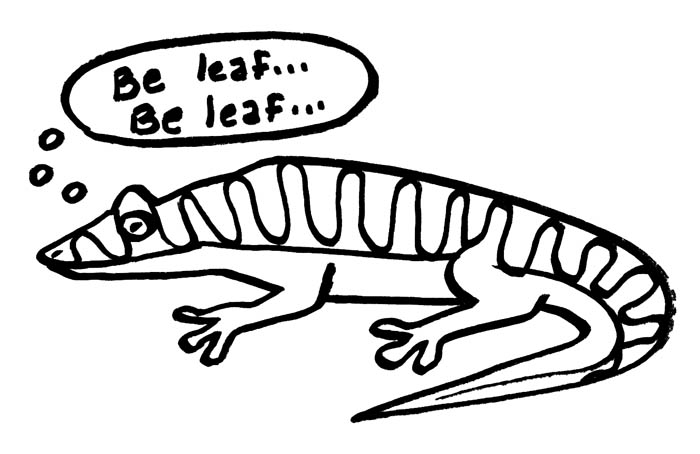
Cunning Cats
All those coat patterns you see on cats and other ambush hunters aren’t just for show – the spots and stripes allow our feline friends to blend into their surroundings while on the prowl. Sneaky sneaky. This helps them to be the amazing hunting machines that they are. Assuming they don’t raise the bird alarm and draw attention to their whereabouts. Because birds do love to raise a stink when there’s a feline predator about, and we can’t say we blame them.
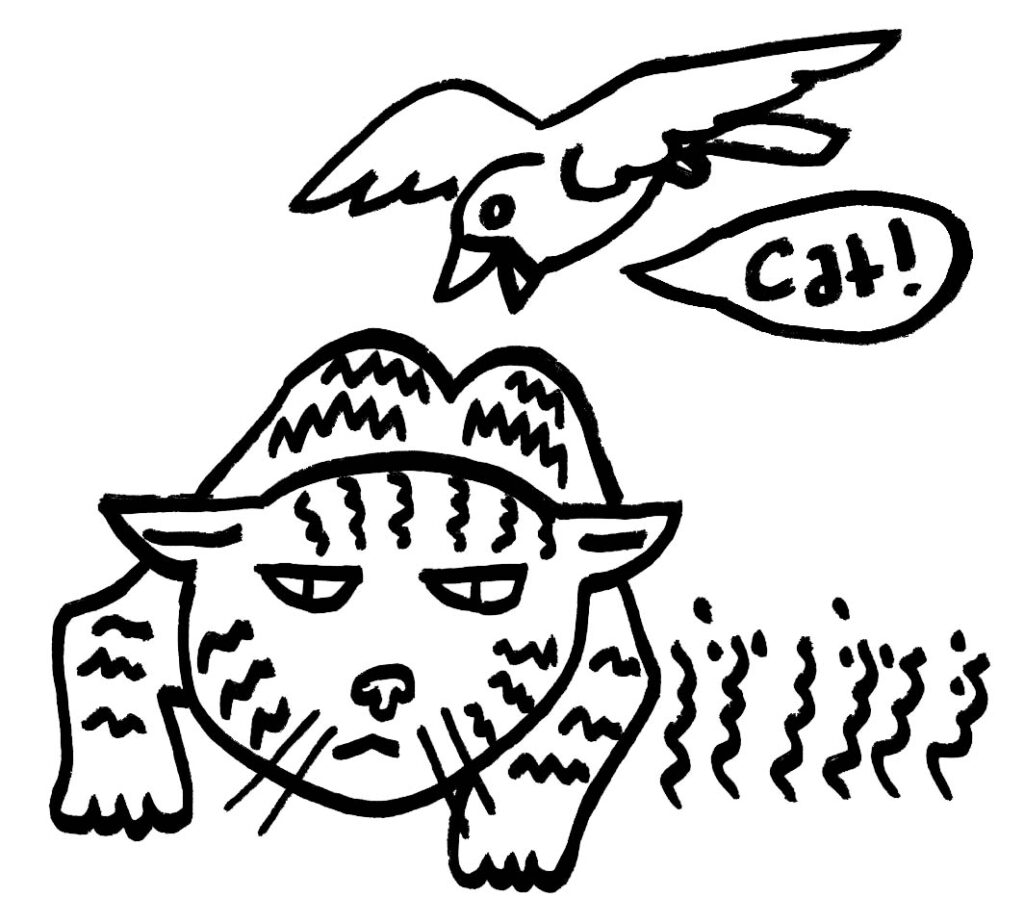
Aquatics
Then when you go underwater, you take it next level. Camouflage is taken up a notch with seahorses, nudibranchs, and more that look exactly like random flotsam. Some critters, such as Majoidea crabs, even decorate themselves with ocean debris to blend in. And octopuses are like underwater chameleons on steroids that also utilize their surroundings to create a sort of protective armor that blends in, like when they carry anything they can grab to protect their squishy selves when sharks are about. There are even true invisibles like shrimp, fish, and jellyfish that are actually clear except for their internal organs that don’t necessarily register with everything floating about underwater. Even whales can appear to come out of nowhere depending on your angle to them to start with!

If you’ve enjoyed this segment of Nightmarish Nature, feel free to check out some previous here:
Original Creations
Alice – A Haunting Tale of Isolation and Betrayal by Baylee Marion
Published
1 week agoon
January 23, 2025By
Jim PhoenixAlice
By Baylee Marion
Empty, breathless, deafening isolation. I was trapped in a single room for as long as I can remember. I was so young but still old enough to know that I shouldn’t have been locked in the attic. I had a mattress on the floor, a toilet, a bathtub, and raggedy stuffed animals that were supposed to provide a sense of comfort.
My days were spent pacing, singing songs I made up to myself, and scratching into the walls. At first, I carved images of myself playing with other children. To imagine how they looked was a challenge, but I was blessed with my own reflection in the glasses of water passed through the slot.
For what purpose my keeper held me was impossible to tell. He spoke to me sometimes, through the small slot only when I was asleep, or so he thought. He would read me stories, tell me about Alice and her tales in Wonderland, and though I didn’t know who she was, I began to believe she was my friend too.
When children grow older, they’re supposed to grow wiser. They are supposed to distinguish what’s real and what isn’t. Eventually, their imagination dulls, and they fall into a rhythm of routine, of work and dining and bonding with their loved ones. At least I know that now, but I hadn’t when I was still alive.
As time passed, I held dearly onto the idea of Alice and eventually, she became real. I wish I could tell you Alice was my friend. I truly believed she was. She began to visit me first at night, maybe formulated by the tales of the strange man. She would stand at the edge of my bed, whispering terrible things.
Eventually, she grew so real she could touch me. Perhaps I manifested her into my reality, or perhaps I was far more ill than I realized. Alice joined me in my songs; she was naturally talented. She could match any song without explaining the words, and her voice would pair a perfect harmony with mine. She would brush my hair, strands falling out in clumps. Apparently, I looked prettier without hair. So Alice brushed and brushed. Eventually, I could see my scalp in my glasses of water.
When I ran out of hair, she told me the dark spots in my skin were the reason I was locked up. She said that if I scraped them out of my skin, then I would be set free. You must understand, as my only friend, I believed every word she said. Friends always told the truth, even if it hurt them, right? So I did as she suggested because I wanted nothing more than to be free.
And to my amazement, she was right! Though my skin stung, my heart heaved with hope that someday I could escape the four walls that composed my world. When the drops of red fell, for the first time in my waking memory, the door opened.
The strange man was no longer faceless. He stood with a big bushy beard and thick eyebrows. His nose was as unremarkable as his hidden mouth. His belly protruded as if he had eaten enough for us both. He reprimanded me for listening to Alice, he urged me that Alice was not real, but she urged me she very much was.
My wounds healed, and Alice explained it wasn’t enough to be set free. I asked what she meant. She told me I wasn’t trapped in the attic at all. No, I was trapped in my body. The hair, the skin, the blood. It was all a cage that kept me from her and from freedom. If I could escape my skin, I would enter the real world, her world, where we could play forever.
I asked her how I could escape my skin when it was all I had ever known. How could I be alive without my body? She told me there were plenty of ways to escape myself. I could bite my tongue in half. I could pry up a sharp piece of floorboard and sink it into my beating heart.
I began to sob because I knew I would never be strong enough to do any of those things. I couldn’t simply strip the suit of skin off and become a ghost like her. The suffering of my misery was a familiar beast, but the thought of biting off my tongue seemed impossible.
But Alice assured me all was well. She said, “I will do it for you.”
I dried my eyes and sniffled. “But how?”
She giggled and replied, “I will switch places with you.”
My mouth hung open in shock. What a good friend she was to suffer the pain I couldn’t. I did not want to face her. The shame that I was sentencing her to the worst fate one could was too much to bear. I was supposed to be her friend. But my suffering was greater than my selflessness.
“Would you?”
She nodded. Lifting my chin under her fingertip, I met her gaze. She stuck out her pinky and gestured to me. I wrapped my pinky around hers, and instantly we switched places. I became a ghost and she became the shell that was me. My eyes could not believe what proceeded. Her hair had begun to grow, strands shining and beautiful, where moments ago I had none. Her skin had healed, no scars remained from the many nights my nails dug into them. In a flash, I became envious of the person she was, the version of me I should have been.
That night when she went to bed, the stranger came to the door to whisper stories. Alice snuck over to the small slot and began to whisper back in a language I have never heard before. The stranger, in a trance, opened the door and set Alice free. She waved goodbye to me as she left, the door wide open for her. I tried to follow her, but the door closed once more. I couldn’t escape. I was left in the attic, a ghost of my old self. I became Alice.
The End
Trending
-
Book Reviews4 days ago
The Midnight Feast: Come for a romp in the Woods.
-
Movies n TV6 days ago
Goosebumps The Vanishing, Back on Track With The Haunted Car
-
Book Reviews2 days ago
Let’s Do Lunch Review – A Witchy, Whimsical Recipe for Chaos
-
Movies n TV3 days ago
Original Sin returns with The Big Bad Body Problem


